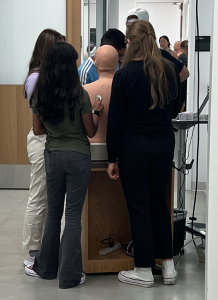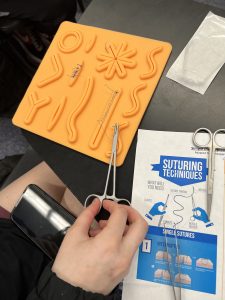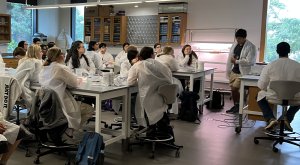STEM+M
CONNECT Program
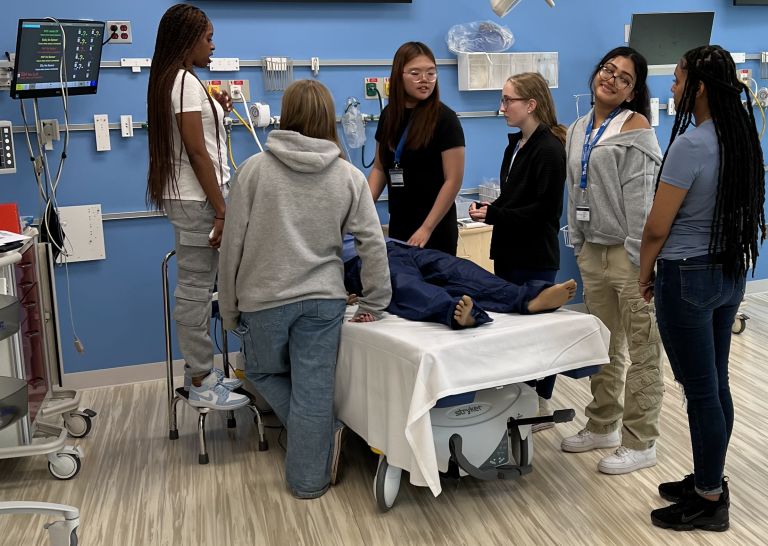
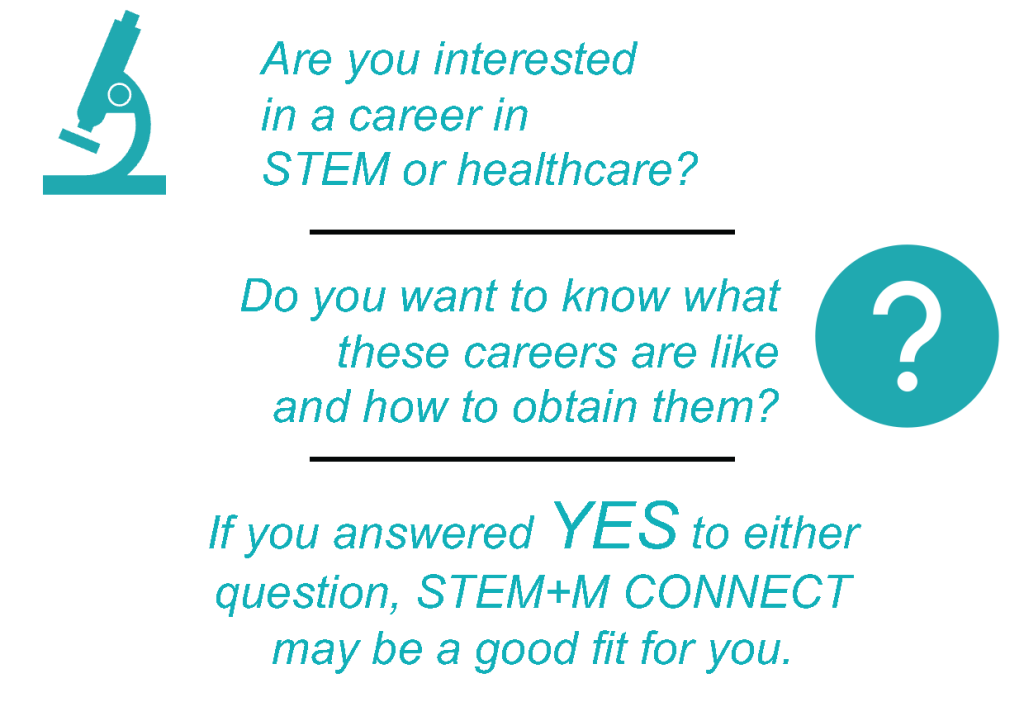
Through a collaboration between Tufts University School of Medicine’s Office for Multicultural Affairs (OMA) and the Center for Science Education (CSE), Tufts STEM+M CONNECT offers high school students a unique one-month paid summer experience that combines a residential experience of Tufts Pre-College programs Mini-Med School or Lab Science Investigations with a multi-tiered mentoring program. The programming is designed for highly motivated students who will be first-generation college students, or who come from low-income backgrounds.
Our goal is to CONNECT you with other high school students, undergraduate mentors, and Tufts faculty to build friendships and networks to support your exploration of career pathways!
The program is funded by Tufts University School of Medicine and other generous donations.
Program Details
Application process:
- Attend a Mandatory Information Session (2026 Dates: Wednesday, January 21 at 8:00pm OR Friday, January 30 at 6:00pm)
- You MUST sign up for a Mandatory Information Session here: registration form
- If you are unable to attend either of the information sessions, please contact us.
- After the information session you will be given a personal link to the application to be filled out online.
- Fill out your application (due March 1 at 11:59pm)
- You must indicate whether you are interested in the Mini Med School or Lab Science Investigations residential Pre-College program.
- You will need:
- A cover letter
- A resume
- Your high school transcript
- Recommendation forms from two adults at your school (one must be your science or math teacher) due by March 15
- You may be contacted for an interview
- Final acceptance letters will be sent by April 17
CONNECT Program goals:
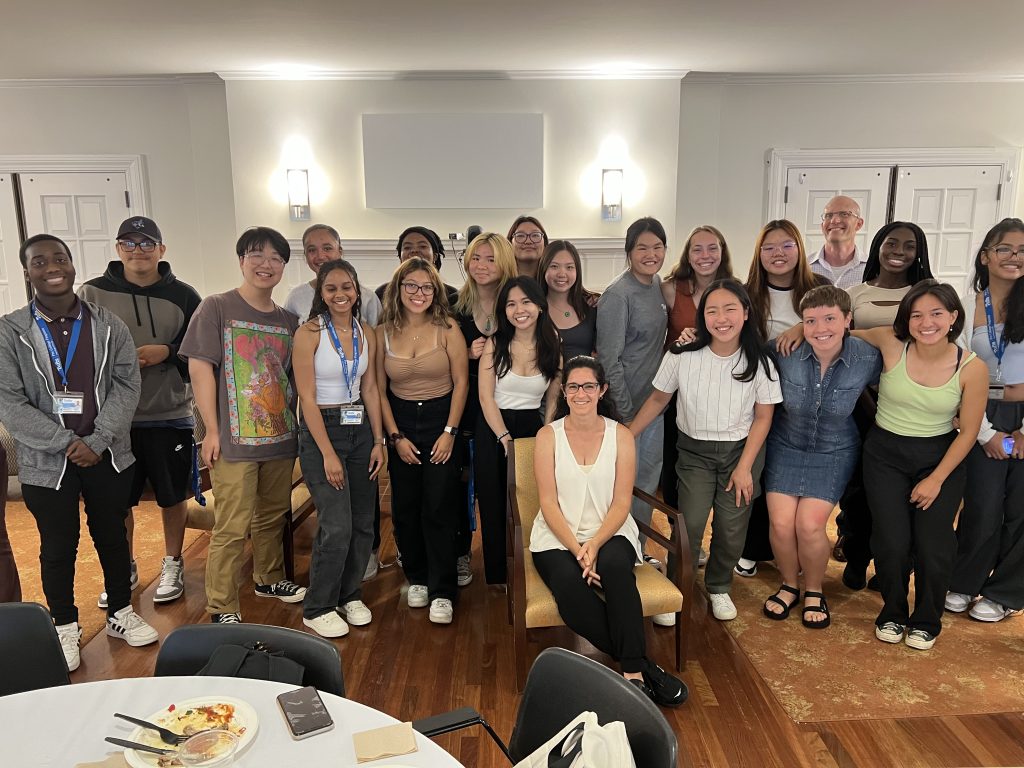

The overarching goal of CONNECT is to increase participation in science and medical professions through offering experiences that build on four key areas:
Program overview:
 The CONNECT programming begins the week before the residential Pre-College programs and continues the week after, with follow-up experiences throughout the next year.
The CONNECT programming begins the week before the residential Pre-College programs and continues the week after, with follow-up experiences throughout the next year.
CONNECT has FIVE key strands: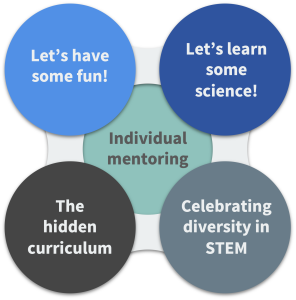
- Let’s Have Fun – Bonding activities to build relationships between high school students and their undergraduate mentors (games, movies, field trips and more)
- The Hidden Curriculum – Workshops about essential professional and life skills that are rarely explicitly taught
- Celebrating Diversity in STEM+M – Spotlights of various STEM+M professional role models
- Let’s Learn Some Science – Activities such as reviewing biology concepts prior to the Pre-College programs and tours of lab spaces
- Individual Mentoring – Structured weekly check-ins with undergraduate STEM Mentors
Mini Med School (MMS) Highlights
As part of the Tufts Mini Med School program, students live on Tufts University Medford campus for two weeks in July. A few highlights of the program include Basic Biosafety Level 1 training, hands-on microbiology and anatomy labs, simulation center patient cases, guidance by medical student TAs, lectures on biomedical topics and career opportunities, patient presentations, and a filmmaking capstone project. For more details, please look at the Mini Med School webpage here.
Lab Science Investigations (LSI) Highlights
As part of the Tufts Lab Science Investigations: Antimicrobial Resistance program, students live on Tufts University Medford campus for two weeks in July.
You will become a researcher working to understand the challenge of Antimicrobial Resistance (AMR) and antibiotic stewardship. Just imagine a world where antibiotics don’t work! AMR claimed 1.27 million human lives in 2019. If trends continue, drug-resistant diseases could cause 10 million deaths annually by 2050, surpassing diabetes, heart disease, and cancer as a leading cause of human death.
As a student researcher in Lab Science Investigations: Antimicrobial Resistance, you will have a uniquely immersive experience with the One Health approach that recognizes that the health of people is closely connected to the health of animals and our shared environment. In the case of AMR, excessive use of antibiotics in agriculture, animals, and people, all contribute to this problem. To address this, you will hear perspectives from experts in many fields who work together at the Tufts Levy Center for Integrated Management of Antimicrobial Resistance (CIMAR), work with laboratory and research techniques used by engineers, social scientists, biomedical scientists, veterinarians, physicians, drug developers, epidemiologists, healthcare policy experts, and environmental scientists.
For more details, please look at the Lab Science Investigations webpage here.
To be eligible, you must:
- Be a current sophomore or junior (graduation year 2027 or 2028)
- Be 16 years old by July 6, 2026
- Be a MA resident and be able to commute daily to the Tufts University Boston Health Sciences Campus
- Be able to commit to 4 week program (full days)
- Have completed at least 1 Biology course by time of program start
- Be authorized to work in the US: US citizen, permanent resident (Green Card holder), or have an EAD
- Be interested in STEM and/or health sciences
- Attend a Mandatory Information Session on Zoom
- Complete our online application
- Receive two recommendations from adults at your school- one must be a science or math teacher
Anyone meeting the above criteria is welcome to apply to the program. Students who will be first-generation college students and/or students from low-income backgrounds are highly encouraged to apply. Selections will be made consistent with university policy and will not consider any information related to protected class as described in the OEO policy here.
Students enrolled in CONNECT will be provided with a full scholarship to the on-campus Mini-Med School or Lab Science Investigations Pre-College programs. This includes housing on Tufts Medford Campus and 3 meals a day from July 5-17 (dinner only on July 5 since move-in happens in the afternoon). Additionally, students will be provided compensation of $2175 upon completion of the four-week program.
Please note that housing and food are not provided from June 29-July 4 or July 18-24 (lunch may be provided some days).
Expenses for travel using public transportation to and from the Tufts campus can be reimbursed if receipts are submitted.
The CONNECT program, formerly called Mini-Med Connect, was launched in 2021 by University School of Medicine’s Center for Science Education (CSE) with support from a Science Education Partnership Award (SEPA) from the National Institutes of Health (NIH), to create opportunities to engage and connect undergraduates and high school students from the Boston area, and to study career interest and persistence in STEM+M careers.
In 2023, the Office for Multicultural Affairs (OMA) and the CSE began a collaboration that bridges the strengths of CONNECT and the Teachers and High School Students (TAHSS) Program. The TAHSS Program was founded in the fall of 1989 with the goals of exposing interested high school students of varied backgrounds to health care and related professions, and providing support in their academic and personal development.
Our current collaboration between CSE and OMA expands access partnering communities in the Greater Boston area, maximizes residential and clinical experiences, and amplifies our capacity to provide academic and personal development to all STEM+M CONNECT students and alumni.
Questions?
For questions about the program, eligibility, or applications, please contact us at SciEd@tufts.edu
